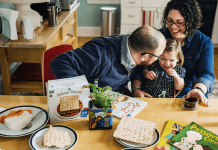My husband and I have walked into my late mother-in-law’s house for the last time.
We are in the process of settling her estate, including the sale of her house and disposition of everything in it.
From a hutch filled with china and crystal goblets to overflowing jewelry boxes and coin collections. And everything in between.
A lot in between.
Her clothes. The Notre Dame sweaters my late father-in-law was so fond of wearing. Her furniture. Furniture inherited from her mother-in-law, still in the same place in the garage where it was originally placed 30 some-odd years ago. My husband’s Cub Scout uniform. Christmas decorations. Lots and lots of Christmas decorations.
Every room, every closet, every shelf, every drawer. Full of stuff. A lifetime of stuff. Two lifetimes, if you count my father-in-law, who passed away 11 years ago.
What to Do With a Lifetime of Stuff
My mother-in-law was a neat and tidy housekeeper. But like many of us (myself included), she lived in a good-sized house with plenty of room to accommodate stuff. Things inherited from her parents and her in-laws. The broken vacuum cleaner waiting for repair in the back of the closet. Hundreds of books read once. You get the picture.
And the cost of disposing of all of that stuff? Having the estate sale company we hired go through every room, every closet, every drawer, separating the trash from the treasures, may cost more than will be generated at the eventual estate sale.
Her house has been transformed into a store, the estate sale company having cleverly arranged and displayed my mother-in-law’s possessions on tables in every room.
All of her possessions with any value, save the very few we kept, each with a tiny white price tag.
Losing your last surviving parent is hard enough. But being the arbiter of which of your parents’ and grandparents’ treasures get saved and which end up sold, donated, or in a landfill? gut-wrenching.
The lesson we have learned from this experience?
Most of the stuff in your house is worthless. And eventually, someone, either you or your kids, will be tasked with the overwhelming job of getting rid of it.
Most of Your Stuff Is Worthless
Most of the stuff in your house is worthless.
Yes, even the stuff you worry the most about, the stuff you think is so good you don’t use it for fear of breaking it, has little to no resale value.
From china, china cabinets, crystal goblets, silver tea sets, pianos, and collectible figurines like Hummels, to grandfather clocks and real pieces of craftsmanship furniture.
Why? Baby boomers have glutted the market with their castoffs, and millennials, the next generation of buyers, don’t want it.
Millennials hate both formal in-home entertaining and use of second-hand goods. With looming student loans, they tend to rent and move often. Who wants to be constantly moving a piano and a grandfather clock from apartment to apartment?
And furniture? There’s no market for so-called “brown furniture,” meaning any furniture (regardless of quality) other than the “mid-century casual” furniture (think clean, lightweight) favored by millennials. Brown furniture is basically firewood.
If it’s not in great condition, it’s also not fit for donation because it can’t be resold.
All of my mother-in-law’s furniture (including the pieces inherited from her mother-in-law and kept for decades)? Straight to the landfill.
Well, Almost Everything…
What do guns, LPs (records), and precious metals/gems have in common?
They are 3 things you might have in your house with a robust resale value.
Silverware also has value, but only if it is real silver and can be melted down.
3 Things You Should Be Doing NOW to Reduce the Amount of Stuff You Have
1. Be viciously thoughtful about holding onto sentimental items.
Here was our goal with sorting through my mother-in-law’s things. Keep just enough to remind us of her, but not so much stuff that our daughters are going to be dealing with it 40 some-odd years from now.
Here’s what we kept:
- A painting to be displayed in our dining room
- My mother-in-law’s treasured Swarovski crystal animal collection (all of which were given to her by her children and grandchildren over the years)
- Jewelry to be divided among the granddaughters
- Each of our daughters got to select 1 item
And that was it.
Well, almost. We did set aside photos to be digitized (with the originals then destroyed).
Was it hard leaving everything else? You bet it was. But we don’t want to be dealing with a lot of stuff years from now (or worse, leaving it to our daughters to deal with).
I try to be viciously thoughtful with my own sentimental items. For example, I don’t save any school papers or art projects from my kids (though I do take photos of my favorites).
2. Buy fewer books.
While used book resellers like Half Price Books do an important service in keeping books in circulation, a surprising number of books end up in landfills because many paper recycling facilities can’t process the the glue that binds book spines.
My resolution last year was to cut down on my book consumption by only reading books that I borrow from the library or purchase on my Kindle e-reader. If you haven’t used a library in years, now is the time to go back. My local library has an app where you can “order” books online, and pick them up the next day on a special “hold” shelf strategically placed next to the check-out kiosk.
How successful was I on my resolution? I read 1 to 2 books a week in 2019, only 1 of which was a hard copy purchased from Amazon.
3. Buy fewer, but better quality, clothes
The world is overflowing with used clothing.
We buy substantially more clothing over our lifetimes than our grandparents did.
Clothing made today is meant to last no more than a few years. In fact, a lot of clothing isn’t even made to withstand more than a few washes.
Think you are “paying it forward” but dropping off a load of unwanted clothes at Goodwill? Think again. Most clothing donations never make it to the racks at Goodwill and only about a third of what does eventually sells.
To really pay it forward, cut down on the amount of clothing you have by buying better quality clothes that last longer.
Keeping What Really Matters
My 5-year-old chose to keep a Christmas music box from her Grandma’s house. It plays “White Christmas” and has tiny ice skaters going around a rink inside. Each Christmas, my mother-in-law would bring out this music box and let each of her granddaughter’s play with it. It’s value in preserving a precious memory of Grandma? Priceless.














One of the difficult things about clothing these days is that even companies that are known for high-quality items are now selling things that also fall apart. I tend to buy a small set of clothing items for my kids and had some leggings for my oldest that lasted through three kids before wearing out. I went to buy replacements from the same company thinking I’d do the same and they started coming apart within two months. It’s so frustrating.
Don’t listen to them, Siobhan. I just spent two years trying to lovingly dispose of my mother’s “treasures”. I tried eBay, neighborhood sale sites, Freecycle, the works. Then I tried the donation locations–ReStore, Salvation Army, local charity shops. After two years of this, most of it still went to the dump. That’s two years I didn’t get to spend with my family. Choose what matters to you, and let the rest go as quickly as possible.
So sad that your daughters only got to choose one iteam and you decided to sell and or throw away the rest. I disagree with the idea that some bloggers have been writting about, that the next generation do not want or understand the value of past generations family belongings. It seems an excuse for not to taking the time to allow for the emotions and egos that take over at a time of mourning. Why hire strangers to go through all Grandma ‘s things. Why not allow your family to uninhibitely take time to look through things. Maybe your attitude or ego prevents family , extended family and friends of the past loved one the chance to have something of some one they loved to. Or maybe they might know some one who collects the boy Scout items. Maybe that troop would like it. Maybe your cousins or their children could use or treasure something. Let’s not assume. Let’s not teach our children that all is worthless by treating it so.
Don’t be in such a rush, no excuses , it takes time, allow for the time to mourn the death of a loved
one. You can do anything you want with your own house hold. But please just don’t think you know what your family and extended family as well as friends may like or not of the one they also loved.
Wonderful article. While my parents are both still alive, this Christmas when I was visiting their house, I felt overwhelmed by the stuff, and the fact that I’ll have to deal with it one day.
I already decided I’ll hire a company, and only keep a few items.
For anyone not using the library- start now! It’s awesome. I used to spend 1000+ dollars a year on books, not to mention the space they took up. Now I get my books through the library.
It is apparent from the comments here, that different people value different things, and I’m glad to live in a country where that is accepted. If we all liked the same thing, it would certainly be boring.
My aunt had to leave her home by airboat with four inches of water in it during Hurricane Harvey. She wasn’t able to return for a few weeks until the feet of water receded. She escaped with a Walmart sack containing an extra pair of shoes and her purse. Most everything was totally destroyed and unable to be salvaged because of mold and ick. It was a devastating loss and took a psychological toll on her. I was able to ‘hand me down’ to her an antique desk that I no longer had room for, bedding that was not the taste of my husband, and some other things. It felt good that they were going to someone who needed them and truly appreciated the gift of them. It also felt good to have the ‘weight’ of things I no longer wanted or needed gone from my home.
I have twice cleaned out my home with the help of a dear family friend. Once before I got married and had to make room for my husband’s things to combine with mine. And once when I became overwhelmed with the stuff that entered my home with the birth and life of my then three year old son. Each time we made dozens of trips to Goodwill. And set aside at least a car load of things for a church garage sale and to give to others who would want/need them. The lasting lesson from both of those experiences is the psychological weight that lifts when things that aren’t needed or are no longer useful to me are gone.
I dread the day when I will have to go through my parent’s home and my in law’s home. It is overwhelming for me to consider because of the size of the task. My mother has a closet full of slides of my early childhood to be gone through. And that is just one small closet in a 2000 sq ft house plus an attic and a garage workshop!
In the end, it is the market that decides the value of a thing. eBay is proof of that! I have no problem with sentimental value and keeping a select number of things that I value. But I don’t want to keep boxes of things of sentimental value either. I don’t have enough closet shelves! If others feel the ‘weight’ of all the stuff like I do, it is no wonder some do not value the stuff of older generations.
My husband and I stored most of his mother’s furniture in our basement for years
because of all the memories. After a time of grieving, we were ready to clean it out and give it all away. We took pictures of the pieces and sets that we planned to post through Craig’s list, but then a better option came our way. At that very time, a local pastor of a poor inner city church asked for furniture as well as clothes for his congregation. There were many children without beds, families without dining room tables, homes with no comfortable places to sit. We sent him all the pictures and he chose among several impoverished families. It was profoundly meaningful to us hear him describe he circumstances of those who would receive our stuff as their treasures.
Pianos are great for someone who wants to learn how to play it. For the right price, many things can be sold to be used.
I can relate; overlooking plethora of loved ones’ prized possesstions that no one wants – unless it’s cash or something really valuable. I’m a baby boomer but not the typical junk collector. Been telling folks many years stuff isn’t worth what they think. Wasn’t one who was interested in a house, and hated furniture because i had to dust it as a kid (mom was a collector). One never knows how much they own until they have to move it.
I recently bought a house and a piano came with it. Previous owner died and the family didn’t want grandma’s piano. Imagine that. Here i go again ?
Thank you for sharing this! I’m early on my minimalist journey, and this landed well as encouragement and reminder of what is important: the relationships and the stories that remind of us those we loved.
We hear about the living condition atrocities across the world. Everytime I enter a GW and see that they have, yet again, had to expand the clothing area, I wonder why these items and others aren’t bundled up and shipped off to those 3rd world countries.
Landfill indeed!